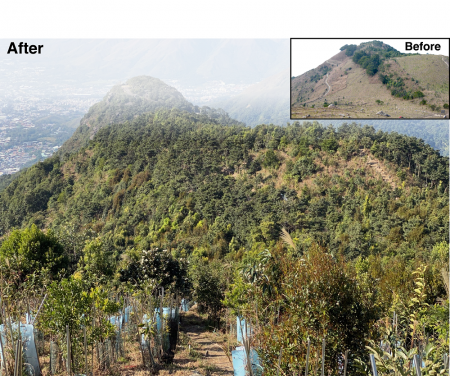Media
HKU Earth Scientists simulated the future:
Restored forests in the tropics survive climate change
Prioritisation and targeting is the key to success
18 Feb 2022
Replanting previously forested landscapes in the tropics is a nature-based solution that can play a role in removing carbon dioxide from the atmosphere, but whether those new forests will withstand the impacts of future climate change was a big uncertainty. There is reason to be hopeful that tropical forests restored today will survive until the end of the century, earth scientists from Department of Earth Sciences, The University of Hong Kong concluded in a new study published in Nature Climate Change.
Solutions to combat global warming require reductions in human-caused emissions of carbon dioxide and other greenhouse gases. But in most cases, we also need to take active steps to remove excess CO2 from the atmosphere. Restoration of previously deforested landscapes may be one of the cheapest and most reliable ways of removing CO2 and safely storing it for centuries as the carbon is incorporated into wood and soils. Over the next decade, large investments are likely be made in forest restoration projects. To plan these projects it is crucial to know if the carbon stored in restored forests will be preserved when subjected to future climate change.
Heat, drought, and wildfires all influence how tropical forests will fare in the future. By performing hundreds of computer simulations with a dynamic global vegetation model driven by a range of future climate scenarios and ecophysiological responses to CO2 concentrations, the researchers found that carbon accumulated in regrowing tropical forests will remain in these forests even under the most severe future climate change scenarios. The researchers further examined hypothetical scenarios where only half of the available land is restored and sites are selected either by lowest cost of land, or the potential to accumulate the most carbon, or both. “Unsurprisingly selecting the cheapest available land results in the lowest carbon drawdown but climate change widens the gap between the scenarios even further,” says Dr Alexander KOCH, who conducted the simulations while a postdoctoral fellow in the Department of Earth Sciences.
Restoring all potential tropical forest areas is likely not feasible for multiple reasons, hence prioritization of forest restoration is needed. Using simulations of forests under future climate change also helps to point to places where climate change impacts are less severe and better suited for concentrating replanting efforts. “Our computer simulations demonstrate that in many parts of the tropics including the natural areas of Hong Kong and southern China, restoring degraded landscapes is worth it because these new forests will continue to accumulate carbon until the end of the century,” says Dr Jed KAPLAN, co-author and Associate Professor in the Department of Earth Sciences and the Institute for Climate and Carbon Neutrality at HKU. The authors note that even in Hong Kong, many protected areas contain landscapes that are suitable for forest restoration, for example in Lam Tsuen, Pat Sin Leng, and Lantau South Country Parks.
“Large-scale tree planting won’t be enough to avoid climate disaster, but it can play a role. And if done with biodiversity and the people who call these forests a home in mind, forest restoration can have multiple benefits,” Dr Koch emphasizes. He adds, “So far we have only been able to look at carbon, but other aspects such as biodiversity in restored forests is also impacted by climate change. Assessing those impacts will be the next step.” Research on the impacts of climate change on biodiversity and ecosystem services in tropical forests is currently underway in HKU’s Faculty of Science.
The journal paper can be accessed from here: https://www.nature.com/articles/s41558-022-01289-6.
Images download and captions: https://www.scifac.hku.hk/press
For media enquiries, please contact Ms Casey To, External Relations Officer (Tel: 3917-4948; email: caseyto@hku.hk) and Ms Cindy Chan, Assistant Communications Director of Faculty of Science (Tel: 3917- 5286; email: cindycst@hku.hk).

